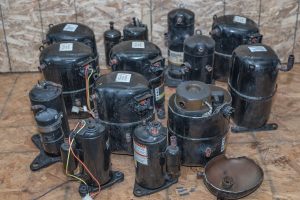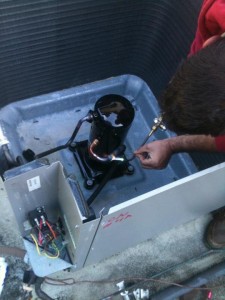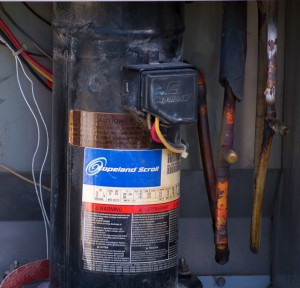 Compressors are the most expensive part of your residential central air conditioning and heating system. They are also the most mis-diagnosed part of the HVAC system also. For training purposes for both home owners and technicians this article is going to cover the most common type of compressor used in residential applications, which is a single phase Scroll compressor. Before continuing read my Disclaimer. Anyone working on compressors or any part of an Hvac system should have at least 2 years of HVAC schooling and at least 3 years of apprenticeship training.
Compressors are the most expensive part of your residential central air conditioning and heating system. They are also the most mis-diagnosed part of the HVAC system also. For training purposes for both home owners and technicians this article is going to cover the most common type of compressor used in residential applications, which is a single phase Scroll compressor. Before continuing read my Disclaimer. Anyone working on compressors or any part of an Hvac system should have at least 2 years of HVAC schooling and at least 3 years of apprenticeship training.
Compressor Not Turning On
First thing I check is the incoming line voltage to the contactor. Most residential applications use approx. 240 volts. I will check the incoming voltage from L1 to L2 and I should get something around 240 volts. Next I check if the contactor is even pulled in or not. If it is pulled in I then check L1 and L2 on the other side of the contactor, which I should also be getting a total of 240 volts. If you are getting 0 volts from the top to bottom of the contactor on both sides then you know that there is voltage going through the contactor. If not then replace the contactor and go from there.
Compressor Hums but Does Not Turn On
If you are getting the correct voltage through the contactor then more than likely you have a weak or open run capacitor, weak or open start capacitor (optional most the times), or bad potential relay for the start capacitor.
If you walk up to a unit and the contactor is pulled in but the compressor is not starting, 9 times out of 10 it’s going to be a capacitor. When it’s not, the compressor is usually very hot and off on internal overload. I usually cool the compressor off with a water hose and once cool I go from there, as there is always a reason that it’s shutting off on internal overload.
Checking for loose or burnt wires should also be something that should come as second nature, especially if you have been doing this for a couple years or more. Which sometimes bare hot wires make contact with grounded metal and….
Breaker Keeps Tripping When Unit Turns On
Next thing I check. Get your amp clamp and put it around the high voltage wire coming in, preferably the common wire (usually black), and then flip the breaker on while looking at the meter. If your meter reads a high amount of amps, such as Locked Rotor Amps (LRA), which can be found on condensing unit name plate and compressor itself, then proceed to the next step of troubleshooting.
Is My Compressor Shorted to Ground?
Turn the power off to the unit. Verify that it is off. Remove the terminal cover from the compressor, and yes you may have to remove the fan motor to get to this. You will have three test leads. Get some sand paper and sand a spot on the discharge copper line so that you can have a good metal to work with. Set your multi-meter to the continuity setting. Put 1 test lead on one terminal and the other on the bare metal. If your read a low resistance, such as 0, or your meter beeps, then the compressor is shorted to ground and needs to be replaced.
Better yet, if you are going to be HVAC technician then get yourself a megaohm-meter. This will tell you without a doubt if that compressor insulation shot or not. Some Hvac technicians will tell you the compressor is either good or it isn’t. There are situations though when the megaohmmeter will verify that compressor is bad or going bad, especially when you get into commercial applications. I myself use a Supco M500, one of the cheaper meggers out there and I have condemned 100,s of compressors with it, and it has never failed me yet. Edit: After years of using the Supco M500 it HAS failed me many times. Do not recommend for compressor troubleshooting. 
Checking the Compressor Windings
This will only work for single phase compressors. If you followed the step above and checked if the compressor was grounded and it checks out good, then here we will check the compressor electrically. Keep your meter in the ohm position. Verify all the terminals. Basically this is as simple as it gets, Common to Start + Common to Run = Run to Start, or should be damn close. For instance if C to S reads .02 ohms and C to Run = .04 ohms, then C to R should be around .06 ohms. If you have resistance between Start+Run and have OL at the others, then you the compressor could be off on overload (check if compressor is hot with back of hand or better yet an infrared thermometer).
Compressor Trying to Start But Doesn’t
This is most common with older compressors or ones that sit idle for a long period of time, can be fine mechanically and electrically but become seized. Sometimes a hard start (start capacitor) can remedy this problem, especially in older compressors that are on their way out, hard starts can sometimes extend the life of it.
Also, if all of the above checks pass, and the compressor still doesn’t want to start because it is seized, whacking it with a rubber mallet may do the trick and free it up.
Should I Purchase a New Compressor?
If your compressor is still under manufacturer’s warranty then yes. But unless you have some kind of extended warranty, then you are going to be paying for labor, which can be from anywhere from $600 dollars and up. Compressor change outs require professional service technicians. If your old compressor failed due to acid, you will need all new refrigerant and also a suction line filter drier or something equivalent such as Acid-Away or similar; to make sure no acid is left in the system.
Anytime a compressor is changed out it should be replaced when the sun is shining, or at least when there is no rain in the area, and when the system is sealed again it should be triple evacuated to at least 500 microns. Something you should ask your Hvac repair man, and which every Hvac technician should be aware of.
If your compressor is out of warranty, and especially if your system is more than 10 years old, you are better off getting a whole new system in my professional opinion.
18 year old scroll in a 3 ton Ruud, has small hole blown between electrical and metal, compressor still runs not shorted to ground, obviously lost charge. Any suggestions on what caused this.
Casing got weak probably due to old age I’m guessing.